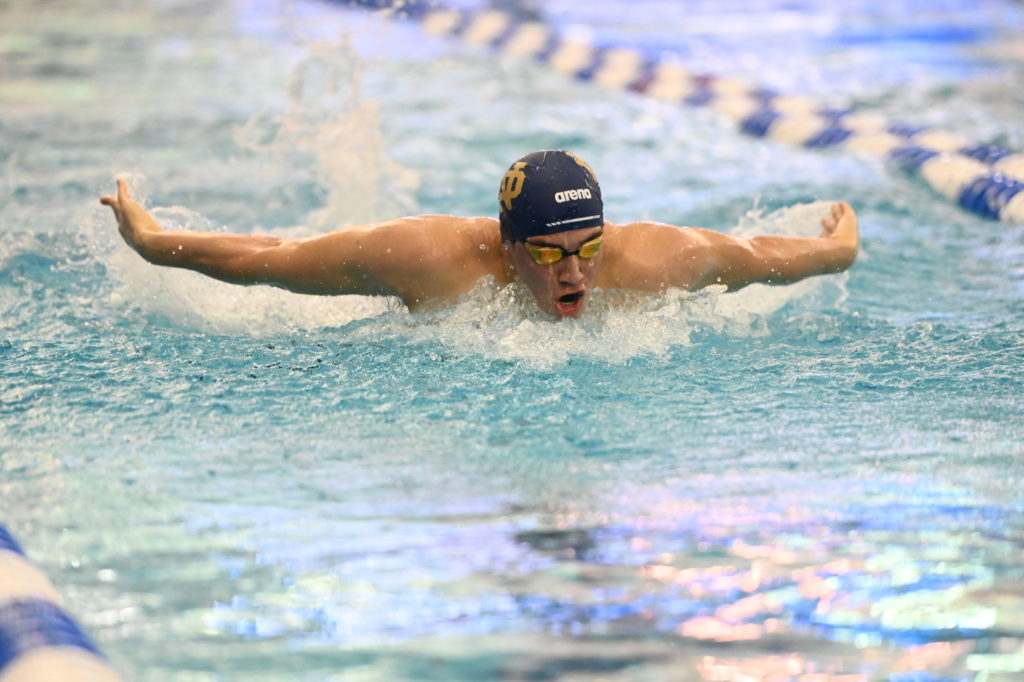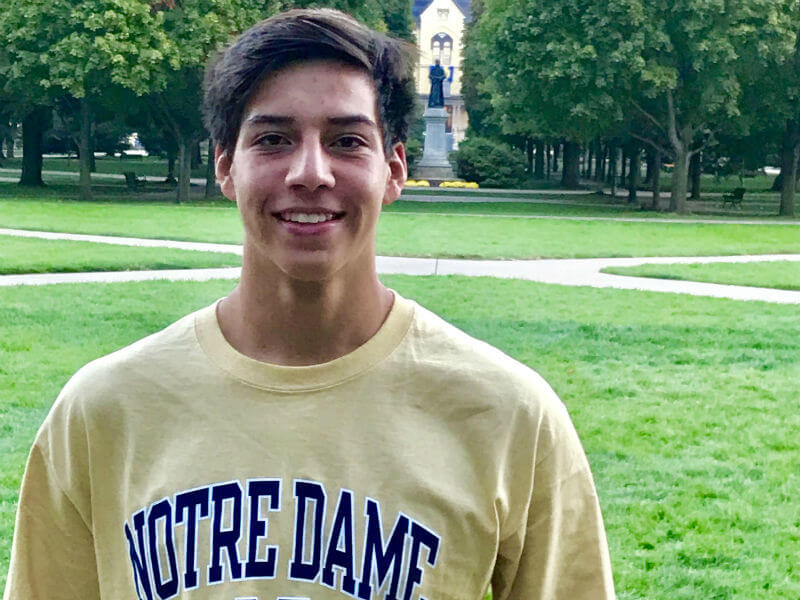After Tokyo Adventure, Notre Dame’s Tyler Christianson Is Looking Forward

After Tokyo Adventure, Notre Dame’s Tyler Christianson Is Looking Forward
Tyler Christianson has always been an athletic kid. But it wasn’t until he watched the 2008 Olympics that he set a formal goal of where he wanted his athletic talent to take him.
It took a few years more, as Christianson developed into a promising age-group swimmer in Maryland, to connect through his mother’s family’s roots in Panama to set a concrete path to that goal.
All those steps, through a daily commute of two hours to train in high school and a pandemic-blighted first season at Notre Dame, hit him when he dove into the Tokyo Aquatic Center last summer. With Panama’s flag on his cap, Christianson absorbed a profound sense of accomplishment, one he’d sketched out in a first-grade school project.
“It wasn’t until I finished that first race, won that heat, that I could look back and feel satisfaction and relief,” Christianson told Swimming World recently, “and really look at myself and tell myself that I’m an Olympian.”
Christianson has reached his goal, but it’s hardly a culmination. The Notre Dame sophomore has an eye on what’s next, and with a shortened cycle to the 2024 Paris Olympics, his taste of the Games heightens his desire to work for a return trip, perhaps with more than just prelims on his mind.
Christianson was hooked on swimming at a young age, but the die was cast while watching the Beijing Olympics. Seeing the explosion of noise as Jason Lezak chased down Alain Bernard in the men’s 400 free relay made up Christianson’s mind: Some way, somehow, he wanted to be there. “I had never seen anything like that in anything I’d ever watched,” he said. “I wanted to do that.”

Photo Courtesy: Tyler Christianson
When he went back to school the next month, as is his Olympic swimming creation myth, his teacher assigned a customary project: What do you want to be when you grow up? Christianson knew what was top of mind.
While none of his classmates may have turned into the movie stars or NFL players they aspired to be, Christianson sees the value in having a clearly articulated goal to chase.
“When you write stuff like that down, it kind of sticks and it’s a goal that I progressively had more and more,” he said from Colombia, where he was set to compete in last week’s inaugural Junior Pan Am Games. “And when I moved to Maryland, my mom really explained to me the opportunity of representing Panama. And that’s when I kind of realized that this dream could come true.”
From the top of his Olympic mountain, that explanation elides a lot of hard work from Christianson and his family to get to Tokyo. First was his development as an athlete. He grew up in New Jersey, dabbling in a variety of sports, but his promise in the pool shined at Jersey Wahoos.
When his family moved to Maryland’s Eastern Shore before he entered eighth grade, finding a similarly high-level club was a challenge. (His high school coach called him a “once-in-a-generation talent” for that region.) To meet his competitive needs, the family shuttled him an hour each way from Easton to the Naval Academy Aquatic Club. That meant four hours out of his daily schedule to train, which required a lot of meals eaten, homework completed and lessons about sacrifice learned in the passenger seat.
“I felt that if I was getting two hours in the pool and it took me a total of two hours to get there and back, ultimately it was worth it,” he said. “And I think it was, and I really improved. It’s a lot on a high school kid to have those four hours taken out every single day, balancing grades and everything like that. And I wouldn’t have had it any other way.”
Christianson excelled at Saints Peter and Paul School, winning three National Catholic Championship titles and six Maryland Interscholastic Athletic Association (MIAA) crowns. He was a three-time MVP of his high school team. At Notre Dame in 2021, he qualified for NCAAs in the 200 breast (24th) and 200 IM (42nd). He also finaled in three events at ACC’s for the seventh-place Irish.
Panama entered the picture when he was 15. He’s always been connected to the large family of his mom, Eny. She is the youngest of seven kids, having met Tyler’s father, Eric, when he was on stationed in Panama with the Army. (As a West Point grad, there was plenty of good-natured nose-holding by Eric when he got Tyler on campus in Annapolis.)
As Christianson improved, he started measuring his times against his Panamanian peers. When he rose to the top of those standings, he saw a chance to avoid the copious competition in the American ranks to make his dream come true. Instead of waiting for the end of his college days to maybe get a chance at U.S. Olympic Trials, against veterans he grew up idolizing and the young prodigies behind them, maybe Panama would offer an earlier and less contentious shot at the Games.
He and his family started the process, getting the necessary paperwork and making trips to regional meets to get his name out there. He started attending international meets to raise his FINA point total and took down his first national records in 2019. He earned a place at the Pan American Games that summer, a big stopping stone to obtaining a Universality place for the Tokyo Olympics. He finished as high as sixth, in the 200 IM. (Tyler is his middle name. He’s the family’s fourth Bernhard Christianson, and he’s often listed in competition under his birth name, Bernhard Christianson or Bernhard Tyler Christianson.) He was one of only two swimmers and 10 total athletes representing Panama in Tokyo.
His journey with Panama strengthened his relationship with that side of his family. Representing his country closed the cultural distance between them, and it’s made Christianson much more connected to a massive family that includes, “aunts, uncles and cousins from ages to 8 to 70.”
“I never really felt in touch with them because of the language barrier and when I’d visit them, it would be once every two, three years,” he said. “Swimming for Panama, I’d have to go down there every few months to compete and do my thing, and I’d pick up on the language more and more and could really bond with them. Through that entire experience these past three, four years of getting ready to go to the Olympics, I’ve really felt really close to them and comfortable enough to talk to them and really feel a close bond with the people of Panama now.
“It’s a total honor to represent them. I would choose Panama over the U.S. any day of the week because I feel such a strong connection to them.”
Christianson is, as he’s fond of saying, “undefeated at the Olympics.” He won both of his Tokyo heats in best times, dropping more than two seconds in the 200 breast to 2:13.41 and a more modest drop in the 200 individual medley to 2:02.70. He finished 29th in the 200 breast and 40th in the IM. Both are Panamanian records, which he also holds in the 400 freestyle, 200 backstroke and 400 IM.
“To win the heat and kind of have the spotlight on me for a little bit and go best times, it was awesome and a great experience in general,” he said.
Ever the goal-setter, Christianson’s focus shifted to the Paris Olympics in 2024 no long after he returned from Tokyo. That has the potential to be a special year, with his final NCAAs in the spring leading to an Olympic summer. He’s taking the condensed three-year cycle one step at a time until then.
That’s why he’s in Colombia for Junior Pan Ams, another chance to represent Panama and one of a pressure few Olympians at a meet being held without either of the reigning continental powers, Canada or the U.S. He took home a bronze in the men’s 100 breaststroke in 1:03.16, Panama’s only medal in the swimming competition.
It also means taking care of business for Notre Dame. Things are a little different now for Tyler the Olympian in South Bend. It’s not in the way he’s treated by teammates, where he’s the same old Tyler. But being the Olympian carries a responsibility that Christianson is eager to shoulder.
“In a way, there’s a new sense of expectation for what I can do, especially being an Olympian,” he said. “There’s a lot of weight that comes with that title, especially in America. You have an Olympian on your team, you’ve got to deliver. You have to bring your performance to another level. That kind of what I’m trying to bring, that next step in my training.”




.png)